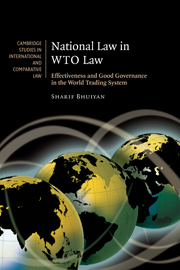Book contents
- Frontmatter
- Contents
- Acknowledgements
- List of abbreviations
- 1 Table of GATT cases
- 2 Table of WTO cases
- 3 Table of other cases
- 1 Introduction
- Part I
- Part II
- 5 The problem of characterization
- 6 Standard of review
- 7 National law as a question of fact
- 8 Mandatory and discretionary legislation
- 9 Conclusion
- References
- Index
9 - Conclusion
Published online by Cambridge University Press: 23 February 2010
- Frontmatter
- Contents
- Acknowledgements
- List of abbreviations
- 1 Table of GATT cases
- 2 Table of WTO cases
- 3 Table of other cases
- 1 Introduction
- Part I
- Part II
- 5 The problem of characterization
- 6 Standard of review
- 7 National law as a question of fact
- 8 Mandatory and discretionary legislation
- 9 Conclusion
- References
- Index
Summary
The tremendous growth of international law and the sharp increase in the number of international courts and tribunals during the second half of the twentieth century have led to many new features and avenues of interaction between national and international legal norms. In this context it is notable that, in the nineteenth and early twentieth centuries, critical analyses of the relationship between national and international law focused primarily on the theoretical debate known as monist–dualist controversy and on the position of international law in national legal systems. The latter concerned issues such as whether, to what extent and in what manner municipal courts in various countries make reference to or do apply rules of international law. Nowadays the questions of whether and how international courts and tribunals refer to, assess or apply rules of national law have become equally important.
Consider, for instance, the issue of the application of national law rules by international courts and tribunals. As may be recalled from Chapter 4, there are cases decided by the Permanent Court of International Justice where, instead of international law, a particular municipal law was applied by that Court as the applicable substantive law. However, the most fascinating jurisprudence and academic discourse concerning the application of national law by international courts and tribunals have come into existence not in the context of dispute settlement by the PCIJ or its successor, the ICJ. Rather, such jurisprudence and academic discourse have emerged in the context of arbitration of disputes between states and foreign companies under state contracts (commonly referred to as mixed arbitrations), largely a late twentieth-century development.
- Type
- Chapter
- Information
- National Law in WTO LawEffectiveness and Good Governance in the World Trading System, pp. 270 - 285Publisher: Cambridge University PressPrint publication year: 2007



